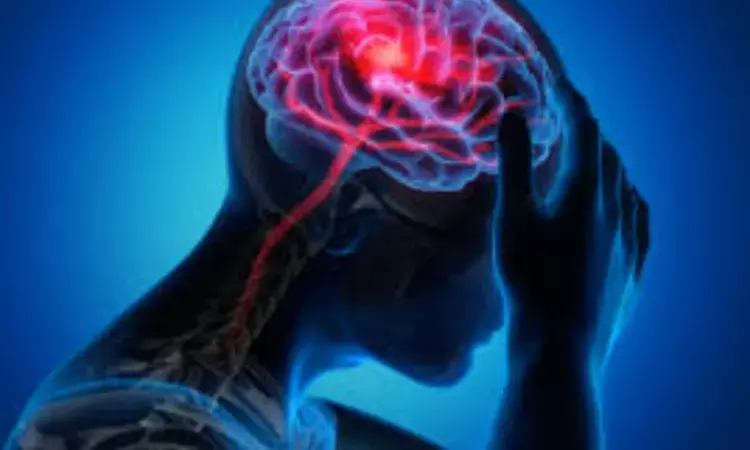- Home
- Medical news & Guidelines
- Anesthesiology
- Cardiology and CTVS
- Critical Care
- Dentistry
- Dermatology
- Diabetes and Endocrinology
- ENT
- Gastroenterology
- Medicine
- Nephrology
- Neurology
- Obstretics-Gynaecology
- Oncology
- Ophthalmology
- Orthopaedics
- Pediatrics-Neonatology
- Psychiatry
- Pulmonology
- Radiology
- Surgery
- Urology
- Laboratory Medicine
- Diet
- Nursing
- Paramedical
- Physiotherapy
- Health news
- Fact Check
- Bone Health Fact Check
- Brain Health Fact Check
- Cancer Related Fact Check
- Child Care Fact Check
- Dental and oral health fact check
- Diabetes and metabolic health fact check
- Diet and Nutrition Fact Check
- Eye and ENT Care Fact Check
- Fitness fact check
- Gut health fact check
- Heart health fact check
- Kidney health fact check
- Medical education fact check
- Men's health fact check
- Respiratory fact check
- Skin and hair care fact check
- Vaccine and Immunization fact check
- Women's health fact check
- AYUSH
- State News
- Andaman and Nicobar Islands
- Andhra Pradesh
- Arunachal Pradesh
- Assam
- Bihar
- Chandigarh
- Chattisgarh
- Dadra and Nagar Haveli
- Daman and Diu
- Delhi
- Goa
- Gujarat
- Haryana
- Himachal Pradesh
- Jammu & Kashmir
- Jharkhand
- Karnataka
- Kerala
- Ladakh
- Lakshadweep
- Madhya Pradesh
- Maharashtra
- Manipur
- Meghalaya
- Mizoram
- Nagaland
- Odisha
- Puducherry
- Punjab
- Rajasthan
- Sikkim
- Tamil Nadu
- Telangana
- Tripura
- Uttar Pradesh
- Uttrakhand
- West Bengal
- Medical Education
- Industry
DAPT within 72 hours can help improve stroke symptoms

Dual antiplatelet treatment (DAPT) has proven to lower the risk of recurrent stroke as compared with aspirin alone when treatment is initiated early (≤24 hours) after an acute mild stroke.
The effect of clopidogrel plus aspirin as compared with aspirin alone administered within 72 hours after the onset of acute cerebral ischemia from atherosclerosis has not been well studied. A new study in New England Journal of Medicine says that DAPT initiated within 72 hours after stroke onset led to a lower risk of new stroke at 90 days than aspirin therapy alone but was associated with a low but higher risk of moderate-to-severe bleeding.
Around 222 hospitals in China, researchers conducted a double-blind, randomized, placebo-controlled, two-by-two factorial trial involving patients with mild ischemic stroke or high-risk transient ischemic attack (TIA) of presumed atherosclerotic cause who had not undergone thrombolysis or thrombectomy. Patients were randomly assigned, in a 1:1 ratio, within 72 hours after symptom onset to receive clopidogrel (300 mg on day 1 and 75 mg daily on days 2 to 90) plus aspirin (100 to 300 mg on day 1 and 100 mg daily on days 2 to 21) or matching clopidogrel placebo plus aspirin (100 to 300 mg on day 1 and 100 mg daily on days 2 to 90). There was no interaction between this component of the factorial trial design and a second part that compared immediate with delayed statin treatment (not reported here). The primary efficacy outcome was new stroke, and the primary safety outcome was moderate-to-severe bleeding-both assessed within 90 days.
Researchers found that a total of 6100 patients were enrolled, with 3050 assigned to each trial group. TIA was the qualifying event for enrollment in 13.1% of the patients. A total of 12.8% of the patients were assigned to a treatment group no more than 24 hours after stroke onset, and 87.2% were assigned after 24 hours and no more than 72 hours after stroke onset. A new stroke occurred in 222 patients (7.3%) in the clopidogrel–aspirin group and in 279 (9.2%) in the aspirin group (hazard ratio, 0.79; 95% confidence interval [CI], 0.66 to 0.94; P=0.008). Moderate-to-severe bleeding occurred in 27 patients (0.9%) in the clopidogrel–aspirin group and in 13 (0.4%) in the aspirin group (hazard ratio, 2.08; 95% CI, 1.07 to 4.04; P=0.03).
Among patients with mild ischemic stroke or high-risk TIA of presumed atherosclerotic cause, combinedclopidogrel–aspirin therapyclopidogrel–aspirin therapy initiated within 72 hours after stroke onset led to a lower risk of new stroke at 90 days than aspirin therapy alone but was associated with a low but higher risk of moderate-to-severe bleeding.
Reference:
Ying Gao, Weiqi Chen, Yuesong Pan, Jing Jing, Chunjuan Wang, Claiborne Johnston, Pierre Amarenco, Philip M. Bath, Lingling Jiang, Yingying Yang, Tingting Wang, Shangrong Han, Dual Antiplatelet Treatment up to 72 Hours after Ischemic Stroke, N Engl J Med 2023, DOI: 10.1056/NEJMoa2309137.
MSc. Neuroscience
Niveditha Subramani a MSc. Neuroscience (Faculty of Medicine) graduate from University of Madras, Chennai. Ambitious in Neuro research having worked in motor diseases and neuron apoptosis is interested in more of new upcoming research and their advancement in field of medicine. She has an engrossed skill towards writing and her roles at Medical dialogue include Sr. Content writer. Her news covers new discoveries and updates in field of medicine. She can be reached at editorial@medicaldialogues.in
Dr Kamal Kant Kohli-MBBS, DTCD- a chest specialist with more than 30 years of practice and a flair for writing clinical articles, Dr Kamal Kant Kohli joined Medical Dialogues as a Chief Editor of Medical News. Besides writing articles, as an editor, he proofreads and verifies all the medical content published on Medical Dialogues including those coming from journals, studies,medical conferences,guidelines etc. Email: drkohli@medicaldialogues.in. Contact no. 011-43720751


